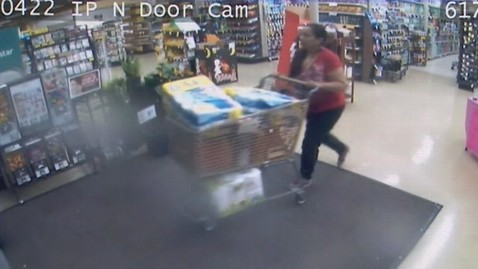Shoplifting on the Rise as Thieves Swipe Small, Pricey Items for Resale

Image credit: KOMO/ABC News
Shoplifting is one of the nation's fastest-growing crimes.
In one video, a man is seen slipping an item into his neck brace. It's almost funny.
Near Tacoma, Wash., a two-woman team of thieves was caught on camera filling carts up with diapers and Tide detergent. When the coast was clear, they made their getaway.
Known as the "Oil of Olay" bandit, one man hit 34 stores in 11 towns across Texas, stealing $20,000 worth of Oil of Olay creams before he was arrested in June.
And in Syracuse, N.Y., police are still looking for a man who allegedly shoplifted $1,000 in organic steaks and lamb chops from a natural-food grocery store in September.
Shoplifting is considered a petty crime, but retail stores may be losing as much as $30 billion a year to shoplifting - with an 11 percent spike in losses from 2010 to 2011, according to the National Retail Federation .
"These items are sold at greatly reduced price when you're talking about flea markets and fence operations," said Richard Mellor, a vice president for loss prevention with the National Retail Federation.
Many of the items that are stolen are personal products such as Crest whitening strips, which sell at retail for about $50. They are a popular target because they are small, easy to conceal and can be resold easily.
Surveillance cameras around stores are catching thieves targeting items up and down the aisles, from early pregnancy tests and shaving razors to batteries and baby formula.
The National Retail Federation and law enforcement officials say the new shoplifting trend involves organized gangs sending in thieves to target scores of stores. They are typically after small and easily concealable, pricey items that everyone wants or needs.
Items like Red Bull beverage and Tylenol Extra Strength can quickly be resold -at a discount - on the street or, in some cases, online to black-market buyers.
Though stores are fighting back by expanding the use of surveillance cameras and electronic alarm tags, it appears to be a game of a cat-and-mouse, with thieves moving on to "boost" the next hot item.